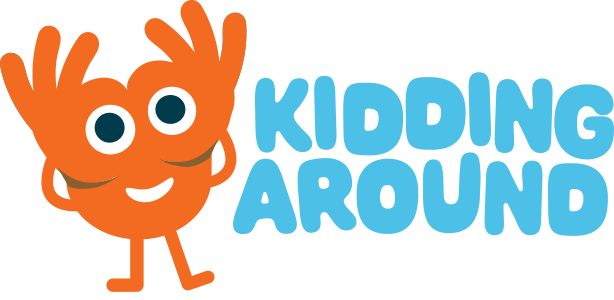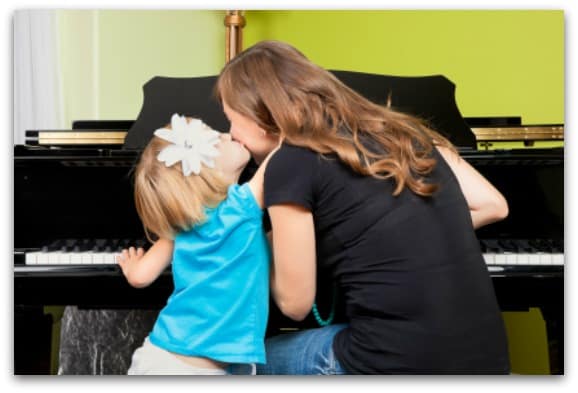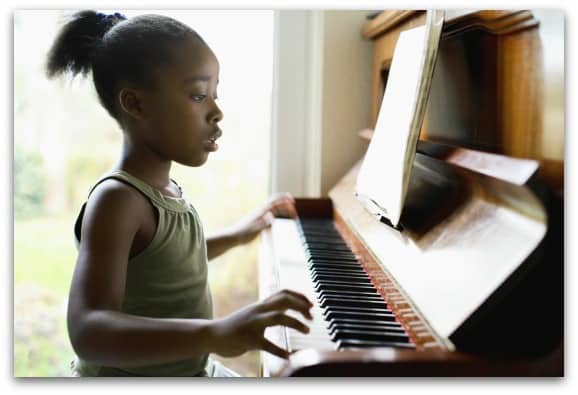Thank you to Theresa Case from our sponsor Piano Central Studios for contributing this article.
Thankfully we live in a community that is very aware and supportive of the arts and all of the benefits that come with early and sustained exposure to the arts. Parents will enroll their very young children in Kindermusik®, for example, because they want their children to develop a love for and interest in music in the hopes that they will continue on with music lessons. But in case the thought of becoming a music lesson parent feels a little daunting to you, or even if you’re perfectly confident about having your child taking music lessons, here are some things you didn’t know you needed to know about music lessons.
Things You Need to Know About Music Lessons
Even “non-musical” parents can have significant influence in helping their children succeed at music lessons.
Whether you have a musical background or not, what your child needs most from you is your support, your interest, and your encouragement. Making sure your child practices, gets to lessons regularly and on time, and knows that you love hearing him play or sing makes all the difference in how far – and how long – your child will keep up with playing the piano or learning to sing.
Music lessons require work and dedication, but there’s big payoff.
Though the effort is a bit different, music lessons are as much a labor of love and dedication for the parents as they are for the student. But the payoff comes when you see the joy in their eyes, the self-confidence that is blossoming, the creativity that begins to inspire every area of their thinking – all because of a developing skill that they can literally enjoy for the rest of their lives.
Your child’s music lesson teacher will eagerly welcome your involvement.
In fact, your child is guaranteed to succeed more quickly, more easily, and more enjoyably if you as the parent take an active role in maintaining an open line of communication with your child’s music teacher and insisting on practice at home throughout the week. You know your child best, and your child’s music lesson teacher loves nothing more than being able to work closely with you.
Just because your child tells you they want to quit doesn’t mean it’s true.
Many times “I want to quit” is because the student is on the edge of breaking through to a new level of musical skill and development, something that always spurs a student on to even greater enjoyment and progress.
If you feel like your child isn’t making much progress, look first at his or her practice habits and routine….
After you look at practice habits and routine, then take some time to talk to his/her teacher. There’s one main thing that results in progress – consistent quality practice. “Quality” being defined as practicing what the teacher asks and how the teacher asks. Chances are that you and the teacher will be able to identify the stumbling block and find a way through it so that your child gets right back on the path to progress.
Your music teacher loves for you to read the notes – and not just the ones on the music you’re learning.
Though the method may vary, every good teacher will have some kind of written assignments plus helpful tips for the week of practice that’s ahead. It’s extremely beneficial to keep the Assignment Notebook open to the page for the week so that you and your child can easily refer to it every practice session.
Taking music lessons in the summer will save you at least two months’ worth of tuition in the Fall.
The intentions are always good, but it’s hard to keep up with practicing and maintaining the skill that’s been gained without the consistency and accountability of summer lessons. It can take 2 – 3 months to regain the momentum, skill, and understanding that will be lost over the summer.
If your child thinks that he doesn’t have the option to quit, he might surprise you with just how long he’ll stick with taking lessons.
You might be thinking that you’re not sure how this “lesson thing” is going to work out, but don’t let on to your child that there’s an option to quit anytime soon – if ever at all. It does something positive to a child’s psyche if he understands that music lessons are an expected part of the routine and something that you are committed to as well. So buy the quality instrument, and then invest the time, money, and care into your child’s musical success right from the very beginning.
It takes three people plus a great program to equal music lesson success – the teacher, the parent, and the student.
You’ve heard it said that it takes a village to raise a child, but when it comes to music lessons, it takes a triangle. It’s the solidity of the teacher-parent-student triangle that can unfold and ignite the musical potential that is in every child.
It’s not just about an activity for now; it’s about an advantage for life.
It’s been said that a love of music is one of the first things to develop and one of the last things to go. Making music not only is a skill that you can enjoy as much at age 80 as you did at age 8; it is also a skill that will increase cognition, improve memory, and continue to give so much joy even as you get older.
Motivation will take your child much farther than talent can.
That’s why it’s so important to find a program and a teacher who works hard to keep your student self-motivated. There is no limit to what a child can accomplish if her or she loves their music lessons.
So maybe this isn’t exactly “everything” you didn’t know you needed to know about music lessons, but hopefully it’s a good start – enough at least to give insight into finding the right program in which to enroll your child for music lessons and to give encouragement that giving your child music lessons is unwrapping a gift they will enjoy for now… and for life.
Learn more about music lessons through Piano Central Studios.
Would your child love to take music lessons?
 A love for music and true enjoyment in teaching and watching others enjoy music is what motivates Theresa Case, Director of Piano Central Studios in Greenville, SC. Theresa started playing the piano at age 4 1/2 and went on to earn a Bachelor’s degree in Elementary Education and a Master’s degree in Music Education. She has spent most of her life building on the “heart connection” she’s always had with music.
A love for music and true enjoyment in teaching and watching others enjoy music is what motivates Theresa Case, Director of Piano Central Studios in Greenville, SC. Theresa started playing the piano at age 4 1/2 and went on to earn a Bachelor’s degree in Elementary Education and a Master’s degree in Music Education. She has spent most of her life building on the “heart connection” she’s always had with music.As the director of Piano Central Studios since 1995, Theresa has grown the program from a small school with a handful of students to the largest community music school in the Upstate. Currently, Theresa is responsible for overseeing the entire program at PCS, managing a staff of over 30 teachers and coordinating Kindermusik classes, music lessons, and art classes at multiple studio and school locations. Along with her wonderful team of teachers, Theresa loves helping to make a difference in the lives of so many families and students who are such a special part of PCS.
By far, Theresa’s best life work includes serving in her church and being a wife and a mother. She enjoys cooking, reading, shopping, and spending time with her husband and three boys.









































What’s the best age to start? My girl just turned 4.
Hi Lee! This is a great question! Your little girl is probably showing lots of signs of musical interest, even at the age of 4, and it’s not too early to foster and develop that budding interest. For children up to age 7, we recommend starting with our Kindermusik program and then transitioning to lessons. Kindermusik gives an excellent foundation in music by not only introducing musical concepts in a developmentally appropriate way, but also by fostering a child’s love of music – something that will set the child up for unusual success when it’s time for music lessons. By… Read more »